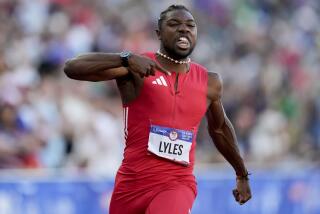Arreola Responds to Urgings With Greater Confidence, Faster Times
- Share via
SAN DIEGO — Darcy Arreola and her coach, Don Strametz, sometimes play a game known to all runners. Call it Coach Knows Best. Or, Run Until You Faint.
Coach: What a super effort, kid! You have been running fabulously, just great, outstanding.
Runner (to herself) : Uh-oh.
Coach: Not that I am unhappy with you, but I think you can run about (pick one) 3, 5, 7 seconds faster.
Runner: No way.
Coach: Yes, you can.
Runner: But I’ve never run that fast.
Coach: You will.
Runner: You think so?
Coach: No question.
Sometimes, such confident talk becomes just that, talk. Or the words take root, they instill confidence, and the runner does go faster.
“If Stram says I can do it, I can do it,” says Arreola, a graduate of Grossmont High School. She is scheduled to compete against Mary Decker Slaney and several other top runners in the 2,000-meter run at Balboa Stadium Saturday as part of the Michelob Invitational.
The confident projections have paid off for Arreola, who won the 1,500- and 3,000-meter races for Cal State Northridge at the NCAA Division II championships last month.
Before that, she set the Northridge record in the 1,500 (4 minutes 15.35 seconds) and came within a half-second of the school mark of 9:12.5 in the 3,000, set by fellow San Diegan Sue Kinsey.
All of which has raised her coach’s expectations.
“She’s ready to run very, very well at the Olympic trials (July 15-23),” said Strametz, Northridge’s women’s coach and the former high school coach of Olympian Valerie Brisco. “The plan is to run sub-4 minutes 5 seconds (in the 1,500) at the Olympic trials final. We feel sub-4:05, you’ll be running for the third spot on the Olympic team.
“We feel we’re right on schedule to do that. Of course, in a meet like that, you have so many variables.”
Many of the world-caliber 1,500-meter runners are several years older than Arreola, who will turn 20 on Aug. 4, the same day Slaney turns 30.
“I know my best running days are ahead of me,” Arreola said. “I need to get in some more races, where I won’t be so scared. I think this race in San Diego is going to help a lot, with so many big runners.”
Like many runners, Arreola improves her stamina by running cross-country. She did well at that, too, finishing fifth in Division II last fall. Ultimately, a longer race, the 3,000, will be an Olympic possibility for her in 1992, Strametz says. Her distance training ended three weeks ago, when the emphasis shifted to speed.
Ideally, the training would result in a far-from-taxing 2:10 in the opening 800 of the 1,500. That would seem to be no problem. As a freshman last year, Arreola ran a 2:05.73--a mark that surprised her and Strametz. It is after the first 800 that Arreola needs to improve.
“Last Tuesday in practice, we had her run a 1,100 to open the workout,” Strametz said. “I told her she needed to go 2:10 the first two laps. She did, and she seemed kind of surprised. But by her own admission, Darcy had a mental letdown the next 200 meters.”
Hers is a pursuit no different from others. The higher you climb, the more critical even a slight lapse will be. While at Grossmont--for which she won the 1,600-meter run at the state championships and section titles in cross-country and the 800--talent alone might have carried Arreola. Now she must entrust more to a coach.
“In high school, I’d do whatever I wanted to do in practice,” she said. “I would rest a lot longer. Here, you don’t get much time between (parts of a workout). It was hard getting used to that.
“Sometimes Stram will tell me something, like a 2:10 (first two laps) in the 1,100, and I will go, ‘Yeah, right.’
“Then it turns out you get closer to that time, you start to believe.”
Not that it always works. Strametz told Arreola she would run a 4:10 at the Pepsi Invitational on June 5. She was more than five seconds shy of that but says she will crack it.
And how would Strametz describe his protege?
“Effervescent,” he said.
So let us go a stretch and say this effervescent runner will someday reach the Olympics. Further, let us conjure one of those up-close-and-personal looks that television provides.
They might bring us to the track, where Arreola speeds by, the perspiration glistening.
They then might cut to a library, where our subject earnestly jots down notes from textbooks.
Take two.
“Don’t put in there that I study hard--everybody would laugh who knows me,” said Arreola, laughing herself. “I stay eligible, barely.”
The perfect athlete who is the perfect student?
“People like that make me sick,” she said, again laughing. “Most runners I know aren’t very good in school, either. I should study more. I get so tired after practice sometimes, I just want to sleep. But that’s just an excuse. Who knows where I would be if it wasn’t for running? I wouldn’t be in school, I know that.”
The slugger is asked how many home runs he can hit. The runner, how fast she can run.
“I don’t know,” said Arreola, who took up competitive running at about age 12 at the urging of her older brother, Paul, now 22, who is a runner himself. “I don’t really say my goals. It’s kind of something I like to keep to myself and not tell anybody. A secret.”
More to Read
Go beyond the scoreboard
Get the latest on L.A.'s teams in the daily Sports Report newsletter.
You may occasionally receive promotional content from the Los Angeles Times.






